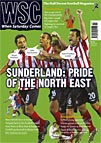 Quito’s El Nacional pick only native players, a policy that is coming under increasing pressure. Henry Mance reports
Quito’s El Nacional pick only native players, a policy that is coming under increasing pressure. Henry Mance reports
As a boy, Juan Carlos Burbano knew never to support foreigners; for a decade as a player, he tried never to pass to them; and now as a coach he is determined to beat them. Such is a life with El Nacional, the Ecuadorian club which only fields locally-born players. “If the national team can do it, why can’t El Nacional?” says Burbano, referring to Ecuador’s unprecedented qualification for the 2002 and 2006 World Cups. “We’ve got low self-esteem in Ecuador, and sport has helped it recover”. El Nacional’s “pure creoles” rule was the idea of their founder, an army captain. Forty-five years later the rule remains, as does military control.
At the club’s pitches outside the capital Quito, a sign proudly proclaims: “Here the best Ecuadorian players are trained and forged.” Unlike the electoral posters which cover the rest of the country this year, it’s probably not lying. El Nacional have produced more Ecuadorian players for export than any other team, from ex-Southampton striker Agustín Delgado to Wigan’s Antonio Valencia, tipped for a move to Manchester United this year. Along with Barcelona, of Guayaquil, El Nacional have won the most league titles, 13 in total.
“Some people say that we’re giving away a big advantage,” says Burbano. “But in Ecuador we’ve got different races. You can choose the best from each group.” The all-Ecuadorian policy is also popular with the ambitious fathers of junior players, who are scattered along the sidelines of the club’s training pitches. “What we’ve got here is something called identity. You can even see it in the name: El Nacional,” one tells me. Yet the focus on national talent doesn’t mean that the club’s youth system is without problems.
Antonio Valencia nearly didn’t make it at all. According to Fernando Baldeón, the club’s youth coach, Valencia “was just a little black kid like the others. In the Under-15s, this coach called Gutiérrez didn’t see much in him. So Valencia’s brother, who was also at the club, asked me to give him a trial for the Under-20s. In four months, he was playing for the seniors.” Only then did the club discover that Valencia had no ID, something which cynics might say explains his prodigious performance at such an apparently young age. Producing players like Valencia on a regular basis is crucial for the main Ecuadorian clubs’ finances, except for Guayaquil’s Emelec, the team of president Rafael Correa which is not-so-coincidentally sponsored by the state oil company of Venezuela, his political ally.
But in a small country where the youth system works slowly, the other clubs have to import to cover gaps. “There’s a first tier of players – from, say, Boca Juniors and River Plate – who aren’t interested in coming here. But there’s a second tier for whom we can compete,” says Esteban Paz, president of Liga de Quito, the current Copa Libertadores champions. Currently around 60 foreigners play in the Ecuadorian league, two-thirds of them illegally on tourist visas.
El Nacional’s Jorge Guagua is sanguine on the club’s policy. “They’re never going to change it,” he smiles. For the last few years, the generals who run the club have met occasionally to discuss the issue and decided that now is not the time to open up to foreign players. However, seeing Liga become South American champions and play Manchester United in the Club World Cup might be a turning point. According to Esteban Paz: “The policy isn’t sustainable. There’s a reason that El Nacional haven’t gone far in the Copa Libertadores.” El Nacional’s youth coach Baldeón agrees. “The Copa is difficult for us nowadays,” he concedes.
But the pure creole policy might not be the only thing worth jettisoning. The military men who run the club are widely seen as inert and corrupt. “It’s absurd,” says Paz. “And it’s the explanation why El Nacional don’t have more fans. There’s no affinity for the military in Latin American countries.” One father wonders aloud: “Why can’t the president be a civilian, someone who actually knows about football? The current guy couldn’t even trap a ball.”
In the past, the link with the military had concrete benefits: $3 (£1.20) was deducted from every soldier’s paycheque to finance the upkeep of the club; the payment’s now voluntary. The armed forces were also useful feeders for the youth system. “In my era, it was more possible that players would emerge from the barracks,” says Baldeón. “Now it’s pretty hard, because players start earlier. But we still have discipline like the military’s.” There’s enough bling on the players as they leave the training ground to suggest otherwise.
From WSC 269 July 2009